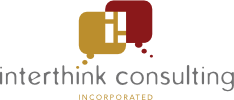A workshop participant for a recent client of mine made the assertion (prior to the actual workshop) that workshops are only effective if they are for no more than three hours per day. The individual went on to suggest that any meeting that is longer is typically just a “show and tell” that doesn’t allow for any meaningful or thoughtful discussion or exploration.
This is an unfortunate perspective, but sadly it is one that is all too common, particularly when considering the development of strategic plans. It’s certainly a shame that this is the experience of the person, and it creates an interesting challenge to overcome in designing an effective facilitation session. What it speaks to more than anything, however, is the likelihood that previous experiences have been ones in which the process is being driven, rather than being facilitated. In other words, there is already a presumed, foregone result to the process that participants are being directed towards.
Guiding towards a defined conclusion isn’t good strategic planning, nor is it particularly effective meeting design. That’s not to say that it doesn’t occur, however. When it does, there are two underlying causes: manipulation or incompetence. Manipulation is certainly the most nefarious reason, where someone is simply trying to advance their own agenda and seeks to co-opt the group in order to obtain an implied endorsement. While Machiavellian in nature, it is also comparatively rare that this actually occurs.
Far more frequent are instances in which groups are guided to an outcome out of incompetence. Where this occurs, it is often an unfortunate by-product of who has been selected to facilitate the discussion. There are, sadly, some who believe that their role as facilitator is to pre-conceive where the group needs to go, and to guide them there. In other words, they need to know the solution the group needs to arrive at, and they view their role as facilitator as one of lining up the Smarties in a way in which the group is led inexorably to that conclusion.
To be clear, this is not facilitation. It is, in fact, blatant manipulation. If the answer is pre-ordained, the workshop is a waste of time. If one person already has—or believes they have—the answer, then the larger group is largely irrelevant. The point of group workshops is collaboration, exploration and the co-operative development of meaning and insight. The purpose of the group is to bring their diversity of skills, experiences and backgrounds into an environment where they can equally contribute. The purpose of the facilitator is to listen to the group, ensure they contribute, and support their conversation. They are their to resolve disagreement, find common ground in differing viewpoints and guide the overall process.
The best facilitators have no clear picture of the outcome the group will arrive at, nor do they have any stake in what that outcome looks like. The outcome will emerge through conversation, and if the meeting is truly worthwhile it will be a better result than any individual could have conceived going into the process. That is, in fact, the entire purpose of the group—to collectively produce a result that they individually could not.
It is not the role of the facilitator to be the smartest person in the room. They are not there to have all the answers. They may not even have all of the questions, in that they will think of more through the process if they are doing their job right.
Going back to the assertion that we began with, then, that short workshops work and long workshops are show-and-tell sessions: in my experience, the opposite is true. Short meetings of three hours or less are designed to get a group to an outcome. It is only be investing the time to truly explore, debate and examine that a group will get to an effective outcome. That takes time, and it takes a lot of it.



Leave a Reply